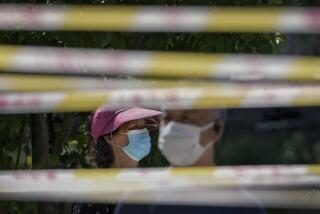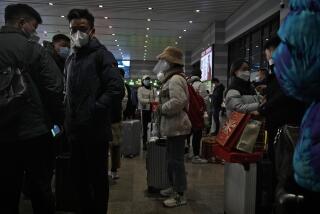Most SARS Outbreaks Contained, Experts Say
- Share via
Scientists concluding a two-day meeting in Geneva said Saturday that the majority of the SARS outbreaks around the world have been contained and that the measures used to control it elsewhere should ultimately prove effective in China, Hong Kong and Taiwan.
“The message coming out of this meeting is ... that the measures are working,” said Dr. Michael J. Ryan, coordinator of the World Health Organization’s Global Alert and Response program. “We have seen the number of secondary cases ... dropping systematically in all of the countries to a point where we now believe, in the majority of cases, we are now seeing the epidemics coming to an end.”
Even in China, which has been the origin and focus of the outbreak, the number of new cases Saturday dropped to 28, the lowest daily toll since the government began requiring full reporting of case numbers.
Only four new cases were reported in Hong Kong, marking the 14th day in a row in which new cases have been in the single digits.
Singapore, meanwhile, posted its 19th straight day without a new case of SARS, bringing it within a day of officially declaring its outbreak contained.
The sole exception to the good news was Taiwan, which reported 34 new cases, the largest increase to date, bringing the island’s total to 308.
As of Saturday, according to the WHO, there had been a total of 7,761 cases of severe acute respiratory syndrome worldwide, with 623 deaths.
The vast majority of those, 6,919 cases and 525 deaths, had occurred in mainland China and Hong Kong.
Scientists from 10 countries infected by SARS were joined via teleconference by researchers from six other such countries in Geneva, where the WHO has its headquarters, for the gathering that concluded Saturday.
At a news conference following their meeting, Ryan said that their mood was one of celebration.
“The really important thing coming out of this meeting is that the experience across the range of countries involved has been that the control measures that we designed at the beginning of the epidemic have worked,” Ryan said. “In country after country, we have managed to break the cycle of transmission through the simple implementation of case finding, contact tracing and isolation practices in hospitals.”
Those same techniques will work equally well in China, Ryan and others said, even though the SARS outbreak there is admittedly bigger and more complex than elsewhere and bringing it to a conclusion will require a high degree of international collaboration.
“SARS is too big for any country to handle single-handedly,” said Margaret Chan, director of Hong Kong’s Department of Health.
The difficulty of controlling the epidemic was emphasized Saturday when the WHO extended its warning against unnecessary travel to include Hebei province, which surrounds Beijing.
Migrant workers and students have been returning to Hebei in large numbers to escape the outbreak in Beijing, but many have brought the disease with them.
The WHO’s warning also includes Beijing and Tianjin and the provinces of Guangdong, Inner Mongolia and Shanxi in mainland China, as well as Hong Kong and the Taiwanese capital, Taipei.
Scientifically, little that was new came out of the meeting -- and in some ways that was reassuring.
The collective wisdom of the researchers, who have been dealing firsthand with the outbreak, tended to reinforce many of the points that the WHO has been making for several weeks. Among their conclusions:
* Only those with symptoms are likely to spread the disease, and the more severe the symptoms, the more likely they are to infect others. Transmission is most likely to occur during the second week of infection. There is some suggestion that so-called super spreaders, who have transmitted the virus to 10 or more other people, were out and about during this period of high infectivity -- indicating that early identification of symptoms and isolation of patients can prevent most such episodes. There is no evidence that people are spreading the disease before they develop symptoms.
* The incubation period is still believed to be 10 days for most people, so there is no need to extend the duration of quarantines.
* The primary method of transmission is via droplets exhaled during coughing or sneezing.
The Hong Kong government is expected to release a report, perhaps today, indicating that the outbreak in the Amoy Gardens housing complex was triggered by feces, but that represents an anomalous case. The leaking sewage there was aerosolized into tiny droplets that were inhaled by other residents.
But there is no evidence that the disease -- like cholera, for example -- can be spread by the inadvertent ingestion of contaminated fecal matter, said Angus Nicoll of the British Health Protection Agency, who chaired the meeting.
Among the research questions that still need to be answered, Ryan said, are whether some people contract the SARS virus without developing symptoms, whether the incubation period can be longer in some cases and how the disease originated.
Work is progressing in all these areas, he said.
The big jump in new infections in Taiwan came just one day after the country’s Health Department chief, Twu Shiing-jer, resigned after taking responsibility for the spread of the virus. He was replaced by Dr. Chen Chien-jen, a Johns Hopkins-trained epidemiologist.
Meanwhile, Dr. Lee Ming-liang, head of Taiwan’s SARS Control Committee, said more new cases were expected as a result of the two most recent hospital outbreaks, at Taipei’s National Taiwan University Hospital and at Chang Gung Hospital in the southern city of Kaohsiung. Both facilities are under quarantine.
In a related development, Japanese officials Saturday were disinfecting hallways and other areas at Kansai International Airport in Osaka after a Taiwanese physician who visited western Japan on a group tour was diagnosed with SARS.
The driver of the tour bus that carried the physician’s group developed a fever and was feared to have SARS but subsequently recovered, and Japanese officials have identified no other suspicious cases. Japan has had no SARS cases.
More to Read
Sign up for Essential California
The most important California stories and recommendations in your inbox every morning.
You may occasionally receive promotional content from the Los Angeles Times.












